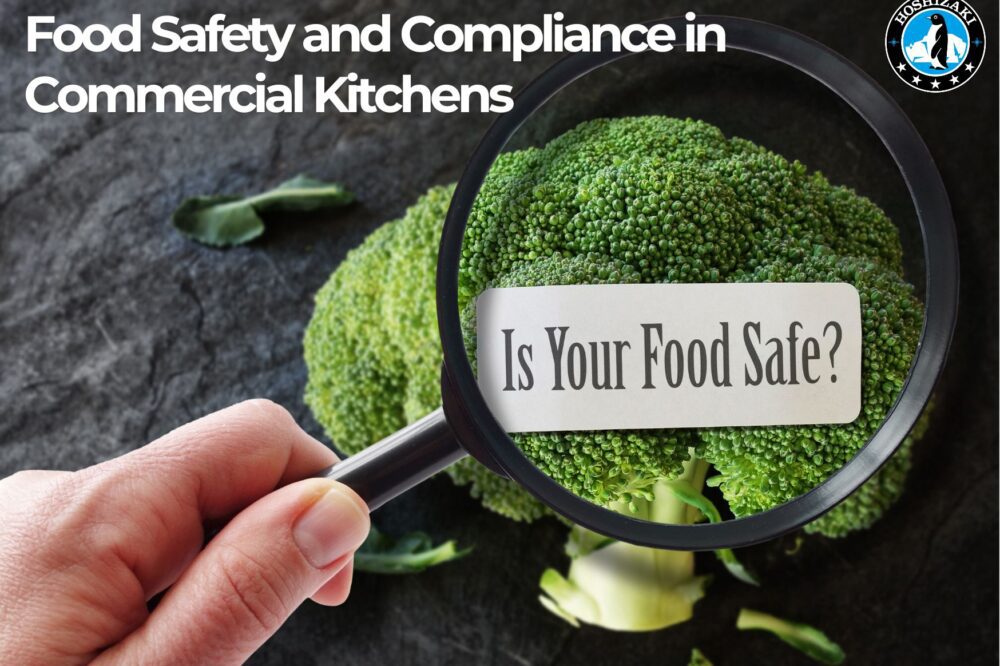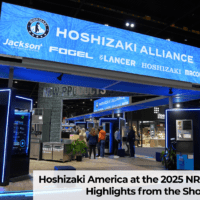
Food Safety and Compliance in Commercial Kitchens
In today’s fast-paced world, food safety is more important than ever. But achieving food safety isn’t just about following a few basic rules. Commercial kitchens rely on a combination of proper equipment and diligent practices to maintain high hygiene standards. This includes everything from maintaining proper storage temperatures to using effective cleaning procedures.
At Hoshizaki America, we understand the critical role commercial refrigeration plays in food safety. We are dedicated to providing top-quality equipment that empowers you to confidently prepare and store food, ensuring a delicious and safe dining experience for everyone.
The Importance of Food Safety in the Foodservice Industry
For restaurants, cafes, and any business serving food, food safety isn’t just a recommendation; it’s a fundamental responsibility. Foodborne illnesses caused by contaminated food can cause a range of illnesses, from mild discomfort to life-threatening conditions. These illnesses can impact anyone, but young children, the elderly, and people with weakened immune systems are at greater risk.
To safeguard consumers, government agencies enforce strict food safety regulations. These regulations outline specific requirements for food handling, storage, and preparation. Failure to comply can result in fines, business closures, and even legal repercussions.
Key Components of Food Safety
- Organize your storage areas: Label shelves and designate specific areas for raw meat, poultry, and seafood to prevent cross-contamination.
- First-In, First-Out (FIFO): Rotate your stock regularly, using older ingredients first to prevent spoilage.
- Proper Container Use: Store food in airtight containers to prevent contamination from airborne bacteria or contact with other foods.
Hygiene Practices
Kitchen staff should wash their hands thoroughly and frequently, especially before and after handling food, using soap and warm water for at least 20 seconds.
Develop a cleaning and sanitation routine that includes:
- Regularly disinfecting cutting boards, utensils, and surfaces that come into contact with food.
- Using appropriate cleaning solutions and sanitizers based on the type of surface and the intended use.
- Implementing a system for cleaning and maintaining your refrigeration equipment to ensure hygienic storage conditions.
Regular Equipment Maintenance
Ignoring equipment maintenance can lead to several risks:
- Malfunctioning equipment could compromise food storage temperatures, creating a breeding ground for harmful bacteria.
- Neglected equipment is more prone to breakdowns, disrupting your kitchen operations and potentially impacting customer service.
Establish a schedule for regular inspections of critical equipment like refrigerators and freezers, paying close attention to temperature control and functionality.
Also Remember…
Keeping food at the perfect temperature is key! Hot dishes need to stay steaming hot, at 140°F or even warmer. For cold items, think icy cold, 40°F or below.
Buffets are all about keeping things fresh. Use chafing dishes, slow cookers, or warming trays to keep hot food hot. For cold items, place serving dishes in bowls filled with ice. Here’s a tip: use smaller serving trays and replace them often to keep everything chilled.
No matter what, always use a food thermometer to double-check those temperatures!
And note, time is of the essence! Don’t leave any perishable food out at room temperature for more than 2 hours (or just 1 hour if it’s a super hot day).
Food Safety Compliance
FDA Food Code: Developed by the U.S. Food and Drug Administration (FDA), the Food Code sets national recommendations for safe food handling practices.
HACCP (Hazard Analysis and Critical Control Points): This science-based system helps identify and control potential hazards throughout the food chain, from purchasing ingredients to serving the final product. While not mandatory for all businesses, HACCP principles are often incorporated into food safety management systems.
Lastly, it’s important to know that many cities and states require food service professionals to be ServSafe certified – kind of like a driver’s license for your kitchen! Administered by the National Restaurant Association, ServSafe provides comprehensive training on food safety best practices. This certification covers critical topics such as proper food handling, sanitation, temperature control, and allergen management. Ensuring your staff is ServSafe certified not only helps you comply with local regulations but also enhances your kitchen’s safety standards, protecting both your customers and your business.
By prioritizing food safety, you cultivate a kitchen environment where both your staff and your customers can thrive. Implementing the practices outlined above – proper storage, hygiene protocols, regular equipment maintenance and food safety compliance – lays a strong foundation.
Hoshizaki America is committed to being your partner in food safety. Our reliable, high-quality commercial refrigeration and ice machines empower you to maintain safe food storage temperatures. Check out our catalog to learn more.
Together, we can ensure that every meal is not only delicious but also safe and healthy for everyone to enjoy.
August 14, 2024
By Maitri Gandhi – Product Marketing Specialist, Hoshizaki America



